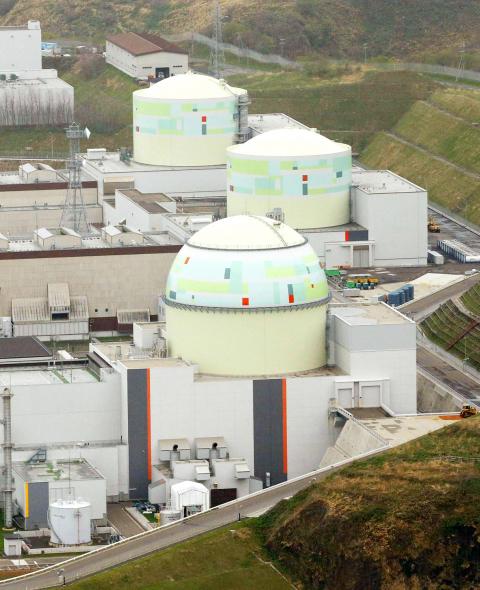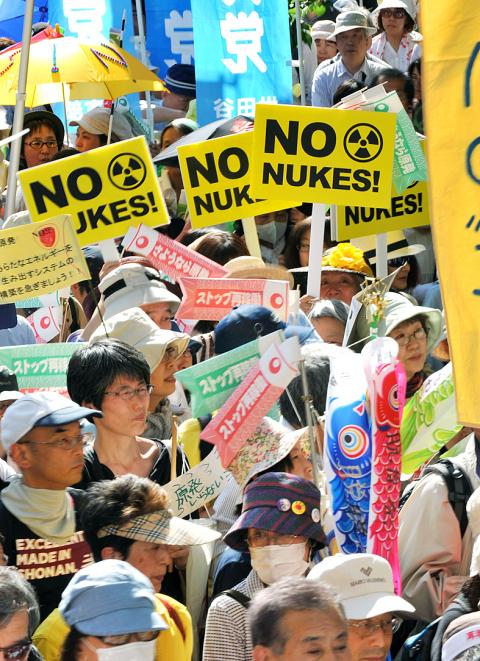A Japanese power firm began switching off the country’s last working reactor, leaving it without nuclear power just over a year after the world’s worst atomic accident in a quarter of a century.
As technicians close down the No. 3 unit at Tomari in Hokkaido, the debate over whether Japan needs nuclear power has been reignited, amid increasingly shrill warnings of summer power blackouts.
Hokkaido Electric Power, which runs the plant, said they started inserting control rods at 5pm that would halt the chain reaction and bring the reactor to “cold shutdown” sometime on Monday.

Photo: Reuters
“Power output started declining at the No. 3 unit,” said Tomohiko Shibuya, a Hokkaido Electric Power spokesman. “We have not heard of any trouble so far. Power generation there is scheduled to stop completely in about six hours.”
The shuttering will mark the first time since the 1970s that resource-poor and energy-hungry Japan has been without nuclear power, a technology that had provided a third of its electricity until meltdowns at the Fukushima Dai-ichi nuclear power plant after the earthquake and tsunami disaster in March last year.
“A new [era in] Japan with no nuclear power has begun,” said Gyoshu Otsu, a 56-year-old monk who joined a protest against nuclear power in front of the industry ministry in Tokyo which supervises the nation’s power utilities.

Photo: AFP
“Generating nuclear power is like a criminal act as a lot of people are still suffering,” said Otsu, wearing white Buddhist clothes.
“If we allow the situation as it is now, another accident will occur,” he added.
Protest organiser Masao Kimura said: “It’s a symbolic day today. Now we can prove that we will be able to live without nuclear power.”
Separately, about 5,500 demonstrators staged a rally at a park near Tokyo Tower and later marched through central Tokyo carrying banners which read: “Sayonara [Goodbye], nuclear power.”
“We have to take action now, so that Fukushima should be the last nuclear accident not only in Japan, but all over the world,” Mizuho Fukushima, head of the opposition Social Democratic Party, said during the rally.
When power generation stopped late yesterday, Japan’s entire stable of 50 reactors would be offline, despite increasingly urgent calls from the power industry and bodies like the Organisation for Economic Cooperation and Development, who fear dire consequences for the world’s third-largest economy.
Last month, Kansai Electric Power, which supplies mid-western Japan, including the commercial hubs of Osaka, Kyoto and Kobe, said a hot summer could see supply fall nearly 20 percent short of demand.
Kyushu Electric Power, covering an area further west, and Hokkaido Electric Power also said they would struggle as air conditioning gets cranked up in Japan’s sweltering summer.

MAKING WAVES: China’s maritime militia could become a nontraditional threat in war, clogging up shipping lanes to prevent US or Japanese intervention, a report said About 1,900 Chinese ships flying flags of convenience and fishing vessels that participated in China’s military exercises around Taiwan last month and in January last year have been listed for monitoring, Coast Guard Administration (CGA) Deputy Director-General Hsieh Ching-chin (謝慶欽) said yesterday. Following amendments to the Commercial Port Act (商港法) and the Law of Ships (船舶法) last month, the CGA can designate possible berthing areas or deny ports of call for vessels suspected of loitering around areas where undersea cables can be accessed, Oceans Affairs Council Minister Kuan Bi-ling (管碧玲) said. The list of suspected ships, originally 300, had risen to about

DAREDEVIL: Honnold said it had always been a dream of his to climb Taipei 101, while a Netflix producer said the skyscraper was ‘a real icon of this country’ US climber Alex Honnold yesterday took on Taiwan’s tallest building, becoming the first person to scale Taipei 101 without a rope, harness or safety net. Hundreds of spectators gathered at the base of the 101-story skyscraper to watch Honnold, 40, embark on his daredevil feat, which was also broadcast live on Netflix. Dressed in a red T-shirt and yellow custom-made climbing shoes, Honnold swiftly moved up the southeast face of the glass and steel building. At one point, he stepped onto a platform midway up to wave down at fans and onlookers who were taking photos. People watching from inside

Japan’s strategic alliance with the US would collapse if Tokyo were to turn away from a conflict in Taiwan, Japanese Prime Minister Sanae Takaichi said yesterday, but distanced herself from previous comments that suggested a possible military response in such an event. Takaichi expressed her latest views on a nationally broadcast TV program late on Monday, where an opposition party leader criticized her for igniting tensions with China with the earlier remarks. Ties between Japan and China have sunk to the worst level in years after Takaichi said in November that a hypothetical Chinese attack on Taiwan could bring about a Japanese

The WHO ignored early COVID-19 warnings from Taiwan, US Deputy Secretary of Health and Human Services Jim O’Neill said on Friday, as part of justification for Washington withdrawing from the global health body. US Secretary of State Marco Rubio on Thursday said that the US was pulling out of the UN agency, as it failed to fulfill its responsibilities during the COVID-19 pandemic. The WHO “ignored early COVID warnings from Taiwan in 2019 by pretending Taiwan did not exist, O’Neill wrote on X on Friday, Taiwan time. “It ignored rigorous science and promoted lockdowns.” The US will “continue international coordination on infectious